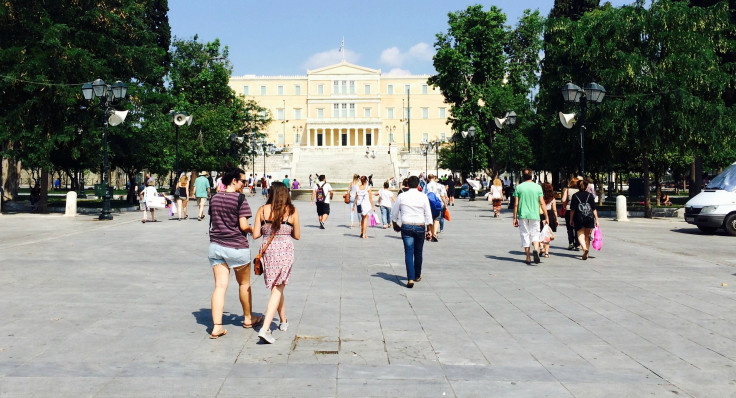In Athens, Empty Streets And Uncertainty Abound As Greeks React To Government’s Austerity Proposal And Await Eurozone Fate

ATHENS, Greece -- The streets in central Athens Saturday resemble the Aug. 15 holiday period when, in better times, most Athenians would be on holiday and few other than tourists would be out and about. The talk of the town is the government’s proposal and whether Greece is heading for a so-called Grexit. Greece’s parliament voted to submit the latest bailout proposal to the Eurogroup, but only 145 out of the 251 “yes” votes in the 300-seat chamber were by government members of parliament, prompting talk of possible snap elections, political instability or a national unity government being formed.
Five days after Greeks voted by a wide margin to reject a proposal for more austerity in exchange for bailout loans, Greece’s left-wing government submitted a new proposal to its creditors. The jubilation many felt when the “no” vote won with more than 61 percent support in the country’s referendum was quickly extinguished as reality set back in. An even harsher proposal was presented by the very same government that vowed to end austerity and the internal devaluation that resulted over the past five years. The latest proposal left many in Greece wondering why a referendum was even held if it would come to this.
Otis Doudos, an 18-year-old student from a working-class suburb of Athens, says Greece’s referendum was a good idea but that the reaction by European creditors diminished its purpose. “I believe that this made the referendum pointless indeed. That it was led to this by the fact that the result of the referendum was not respected by our European partners,” he says.
Fresh out of high school, Doudos will begin his university studies in the fall and faces tough odds with the youth unemployment rate at more than 50 percent.

Most here do not want to return to the drachma, but Doudos begs to differ. Enough is enough, he says. “I’d rather be tortured for two years in a savage way,” he says, “than for five years in a less savage way.” However, Doudos is optimistic that Greece will see better day ahead. “I believe that everything at some point has an end, so this will end as well. There might be faster routes to that or slower, but I think there will be a way that it will end.”
Greece’s new proposal for unlocking desperately needed loans to make heavy debt repayment deadlines encompasses an austerity program totaling 13 billion euros ($14.5 billion). This would come in exchange for more than 50 billion euros ($55.8 billion) in funding from the European Stability Mechanism. The cuts include pension reforms, raising the retirement age to 67 and tax hikes, including an end to special tax treatment for the shipping industry and several islands that have enjoyed the tax status for decades. Tax hikes won’t be limited to corporations and the shipping industry, however. The proposal also calls for increases in value-added taxes (VAT), which stand to hit small businesses and consumers. Eight in 10 Greeks do not want to return to the drachma, but many have mixed reactions to signing a new deal to prevent exiting the common currency, wondering which is really the lesser of two evils.
Dimitris Ranios, a 75-year-old pensioner whose pension benefits have been cut twice in the past five years, says he hopes the government does whatever it can to save Greece from being kicked out of the eurozone. “I voted ‘Yes’ in the referendum because I don’t want to Greece to leave Europe,” he says. He also criticized the government’s decision to hold a referendum considering the proposal they offered to the creditors afterward included deeper austerity. “They changed the ‘No’ and made it ‘Yes,’ but [Greek Prime Minister Alexis] Tsipras did say before he was elected that he doesn’t want us out of Europe.”
Bank closures and capital controls have hit people’s everyday lives considerably in Greece the past two weeks, but those who depend on retirement funds have been hit especially hard. With limited access to their monthly income, several bank branches opened to accommodate them, allowing those who do not have ATM cards to withdraw 120 euros ($134) per week.

Ranios is confident the creditors will accept this new proposal and prevent Greece from exiting the eurozone, but is worried about what comes afterward. “Brussels may agree to this deal, but Tsipras will have problems after this is over because of dissent in his own party,” he says.
Tsipras may have little choice but to call snap elections or have his party become a partner in a national unity government after a deal to keep the country in the eurozone is secured. Having just cast their ballots in national elections this year, many -- like Ranios, who did not vote for Syriza -- hope the country does not have to go through another so soon. “How can we have elections every five months?” he asks rhetorically. “That costs money, too, you know.”
Pantelis Chatzisinakis, who runs a small tax office in the Athens neighborhood of Nea Smyrni, says this new memorandum, if agreed upon and implemented, may avert a Grexit, but will be worse than the previous two bailouts. “These measures will, again, hit small businesses, independent workers, as well as wage earners,” he says.
In Greece at present, the VAT is assessed in three categories: 23 percent as the main rate, 13 percent for food products and 6.5 percent for books, medicines, theaters and tourism. Under the new proposal, many products previously given the reduced VAT rate would be taxed at 23 percent, including food staples such as flour, pasta and rice, resulting in a price hike at a time when entire families are living on less than 1,000 euros ($1,116) per month.

Chatzisinakis says this will hurt the Greek economy because it will hit consumption and tourism, the only sector of Greece’s economy that’s performed well in recent years. “It’s very simple, people will buy less,” he says. “They’ll buy less petrol, less food, they won’t go on vacations, and it will discourage tourism due to price increases.”
Although he doesn’t see the Greek proposal for new measures as a good plan for Greece, he is hopeful it will at least keep Greece in the eurozone. “If we go back to the drachma, now that we’re so dependent on imports, it would be much more difficult, especially for small businesses who need to import the products they sell,” he says. “It would be a very big disaster.”
Whether Greece remains in the Eurozone after the crisis, the damage to its economy and its perception of the rest of Europe will be scarred even among strong supporters of European integration. “We believed when we joined Europe that we were going into an integrated union where one would help another but now when things are tough, half say we should be kicked out, others say stay but pass harsher measures,” Chatzisinakis says.
© Copyright IBTimes 2024. All rights reserved.





















